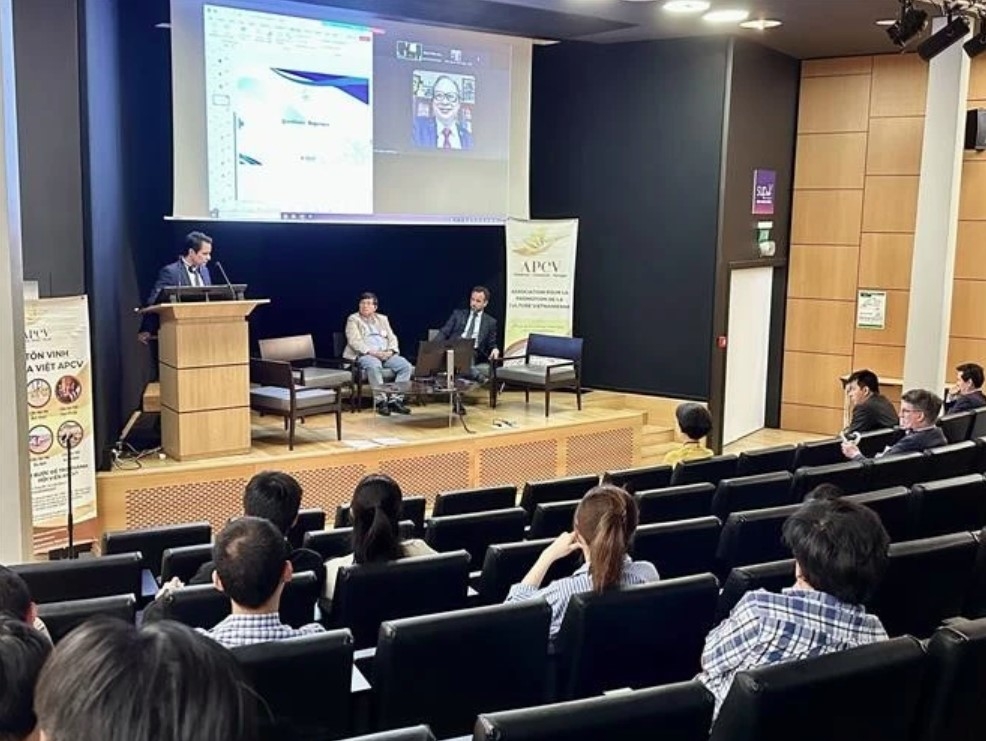Forum spotlights AI and digital innovation in healthcare
An international conference on digital and AI strategies in healthcare took place in Paris on June 13, drawing leading experts from France, the UK and Vietnam.

The event was to explore breakthroughs in digital health and artificial intelligence (AI), while also highlighting new opportunities for international cooperation.
Experts at the forum noted that the world is undergoing a major shift from traditional healthcare models to "smart healthcare," where data and algorithms are central to diagnosis, treatment, and disease prevention.
Dr. Tran Van Xuan, chairman of UK-based Brain-Life, presented on the integration of AI with Brain–Computer Interface (BCI) technology to detect early signs of mental health issues and enhance productivity. He emphasised the vast potential for applying this technology in educational and professional settings.
Assoc. Prof. Dr. Nguyen Viet Nhung, Dean of Medicine at University of Medicine and Pharmacy, Vietnam National University (VNU) Hanoi, spoke about Vietnam’s strategy for digital transformation in medical education. To achieve its goal of becoming a developed nation by 2045, Vietnam is prioritising the integration of AI and digital tools into the training of future doctors. A survey at VNU revealed that while 68% of medical lecturers believe AI tools like ChatGPT, Tome, and SlidesAI enhance teaching quality, 72% still feel unconfident using them, underscoring the urgent need for systematic training.
From a clinical perspective, Alexandre Drezet, Director of Innovation at Foch Hospital France, shared practical experience in implementing digital technologies in hospital settings. These included telemedicine services, over 5,900 online consultations, and 6,000 remote monitoring cases, as well as generative AI used to automate medical recordkeeping. He also introduced the hospital’s “AI Committee” model, which includes cross-functional representatives to ensure transparency and coordination in AI deployment.
In the field of pharmaceutical development, Prof. Philippe Moingeon, former Harvard Medical School researcher, described how AI is revolutionising drug discovery, cutting development time from 5–7 years to just two. Currently, 120 to 150 AI-designed drugs are undergoing clinical trials, with early results showing promise.
Despite these advantages, speakers acknowledged that high costs remain a significant barrier. Dr Xuan pointed out that even the cheapest BCI devices currently cost 1.5 times the average monthly salary in Vietnam. However, he expressed his optimism that with local production and optimisation, this could drop to around US$100, making the technology widely accessible to the Vietnamese population.
Data privacy and cybersecurity were also raised as major concerns. Overcoming these challenges, Dr. Xuan argued, requires comprehensive information strategies, training, and tangible demonstrations of effectiveness.
The France–Vietnam partnership in digital health is seen as highly complementary. France brings advanced technologies and experience in medical research, while Vietnam offers a young, mobile-first population ideal for adopting low-cost mental health innovations.
Dr. Xuan proposed a collaborative model, "Make in Vietnam – European Quality – Worldwide Market", that leverages Vietnam's affordability and talent pool alongside Europe’s technological and commercialisation expertise.
A key theme of the conference was the shift from Industry 4.0, focused on automation and efficiency, to Industry 5.0, which is human-centric and resilience-oriented. This transformation is especially critical in healthcare, where technology must serve to enhance human wellbeing.
Experts proposed a range of policy recommendations for governments and stakeholders, including promoting open innovation ecosystems in neurotechnology, funding R&D for mental health tech, encouraging public–private partnerships, supporting BCI pilot programmes, integrating focus-enhancing technologies into national digital health strategies.
Speakers unanimously affirmed that AI and digital technology in healthcare are no longer concepts of the future, they are part of today’s reality, with successful early applications already emerging around the world.
The France - Vietnam partnership in this sector holds great potential, not only for economic gains but also for addressing pressing global health challenges. With France’s technological prowess and Vietnam’s dynamic market, both countries are well-positioned to become pioneers in the global digital healthcare revolution.



